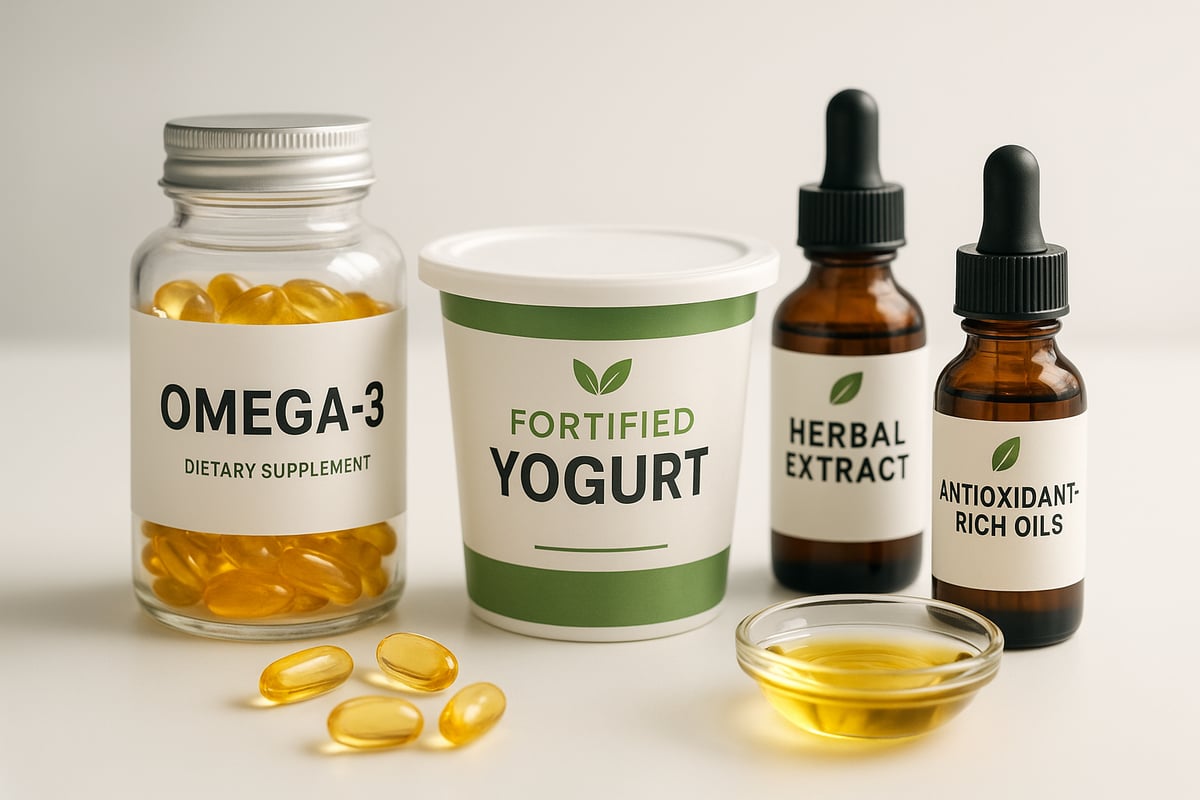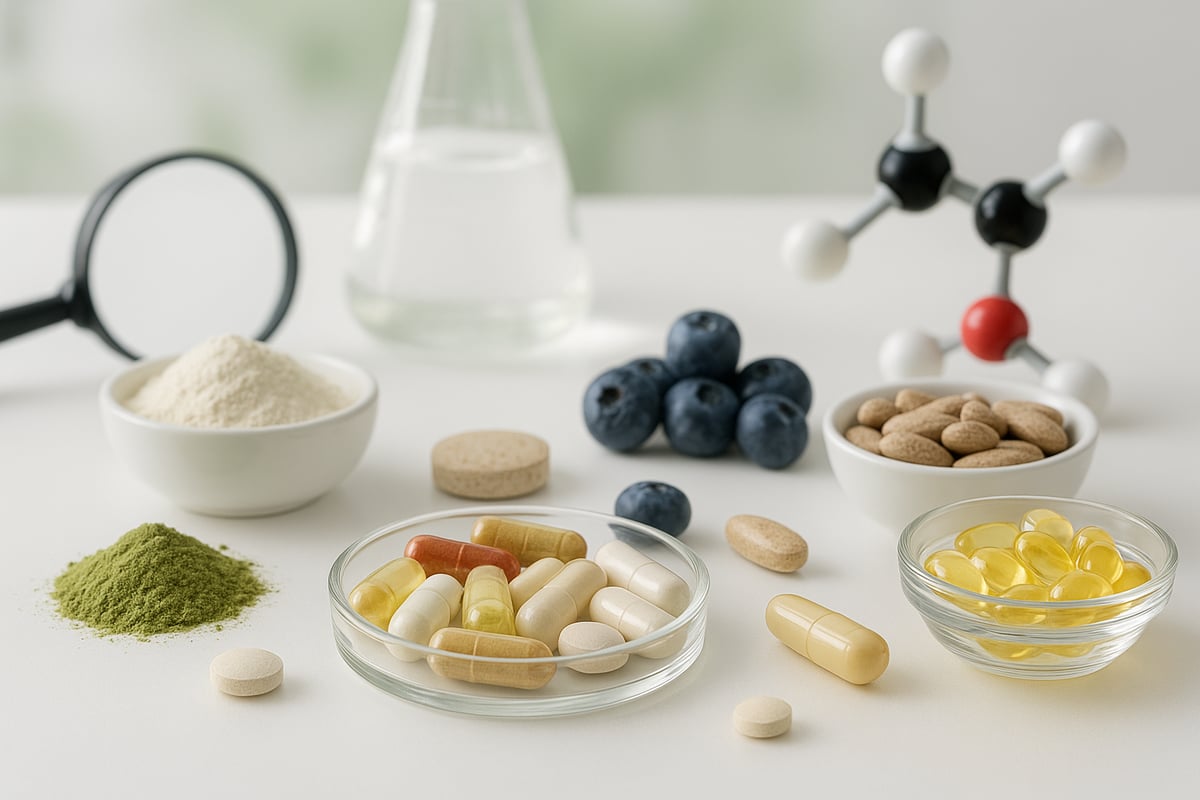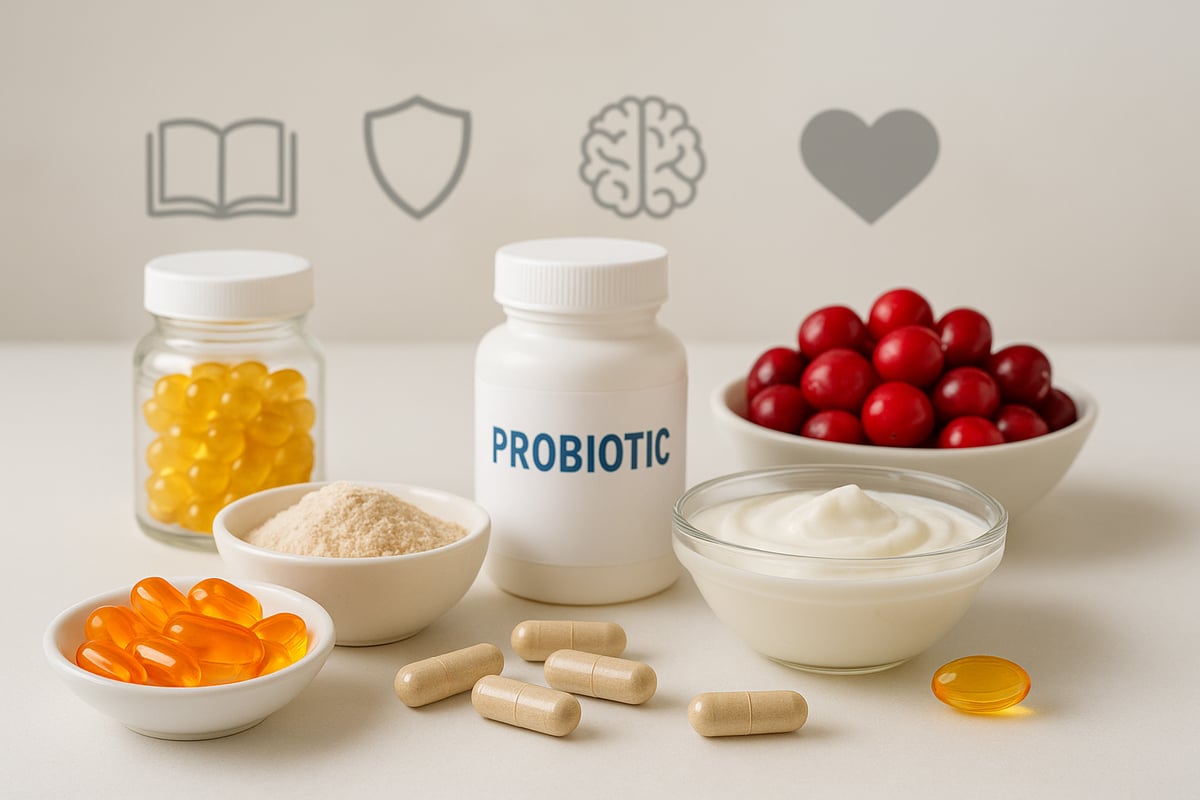Guide to the Health Benefits of Nutraceuticals in 2025
The global nutraceutical market is on the rise, projected to nearly double from $540 billion in 2022 to over $1 trillion by 2030. This surge highlights a growing demand for natural approaches to health optimization and disease prevention.
Consumers are increasingly seeking alternatives that go beyond basic nutrition, aiming for products that support long-term wellness. Understanding the health benefits of nutraceuticals is now more important than ever.
This guide will walk you through everything you need to know about nutraceuticals in 2025. You will discover what they are, their main categories, the science behind their effectiveness, safety considerations, regulatory updates, and how to incorporate them into your daily routine.
Ready to make informed choices for your health? Let’s explore the future of nutraceuticals together.
Understanding Nutraceuticals: Definitions, Types, and Market Growth
Nutraceuticals are products derived from food sources that offer extra health benefits beyond basic nutrition. This rapidly growing category is reshaping health routines worldwide. The health benefits of nutraceuticals are driving their popularity, with consumers seeking solutions that combine the best of nutrition and science.

Nutraceuticals fall into several main categories, each offering unique ways to deliver health benefits. These categories include dietary supplements, functional foods, medicinal foods, farmaceuticals, and nutraceutical beverages. Understanding these types helps consumers make informed choices about the health benefits of nutraceuticals.
| Category | Description | Example |
|---|---|---|
| Dietary Supplements | Concentrated nutrients in pill, capsule, or powder form | Omega-3 capsules, vitamin D |
| Functional Foods | Everyday foods enhanced with bioactive compounds | Fortified yogurt, probiotic drinks |
| Medicinal Foods | Formulated for dietary management of diseases | Gluten-free medical shakes |
| Farmaceuticals | Bioactive compounds from genetically modified crops | Plant-based omega-3s |
| Nutraceutical Beverages | Drinks with added health-promoting ingredients | Antioxidant teas, herbal juices |
Unlike conventional supplements, nutraceuticals often contain complex mixtures of nutrients and active compounds that work together to provide broader health effects. In contrast to pharmaceuticals, which are strictly regulated and intended for disease treatment, nutraceuticals are typically marketed for prevention and wellness, offering a more holistic approach.
Examples of nutraceuticals include omega-3 capsules for heart health, fortified yogurts supporting digestion, concentrated herbal extracts for immune support, and antioxidant-rich oils like extra virgin olive oil. For a deeper look at definitions and examples, visit What Are Nutraceuticals?.
The global nutraceutical market was valued at $540 billion in 2022. It is projected to nearly double by 2030, reflecting explosive demand for the health benefits of nutraceuticals. This growth is fueled by consumers seeking natural, effective ways to support wellness.
Demographic trends reveal that adults over 45 are adopting nutraceuticals at higher rates. Proactive health consumers of all ages are also turning to these products to optimize health and prevent disease. The COVID-19 pandemic accelerated this shift, as people worldwide became more focused on immune support and preventive care.
Key drivers behind this market surge include an aging population, the rising prevalence of chronic diseases, and a growing demand for natural health solutions. As more people experience the health benefits of nutraceuticals, their role in modern wellness routines will only expand.
The Science Behind Nutraceuticals: Mechanisms of Action and Efficacy
Understanding the science behind the health benefits of nutraceuticals is essential for making informed choices. These products interact with the human body in complex ways, offering more than just basic nutrition. Let us explore how nutraceuticals work and what the latest research reveals about their effectiveness.

Nutraceuticals and the Human Body: How They Work
Nutraceuticals deliver health benefits of nutraceuticals through several biological pathways. Many act as antioxidants, neutralizing free radicals and reducing cellular stress. Others have anti-inflammatory properties, helping to manage chronic inflammation that can lead to disease.
A key mechanism is gut-brain axis modulation. Probiotics and prebiotics support a healthy microbiome, which influences mood, immunity, and even cognitive health. Some nutraceuticals enhance immune system function by boosting the production of protective cells.
Bioavailability is another important factor. Advances like nanotechnology and liposomal delivery systems are improving the absorption of active ingredients. This means the health benefits of nutraceuticals are becoming more accessible, as more of the beneficial compounds reach target tissues.
Certain nutraceuticals also affect neurotransmitter levels. For instance, magnesium and herbal extracts can modulate the GABA system, promoting relaxation and better sleep. Curcumin, found in turmeric, demonstrates anti-inflammatory action by inhibiting specific molecular pathways, while probiotics reshape the gut microbiome, influencing both digestion and mental health.
Recent studies support these effects. For example, clinical trials highlight curcumin’s ability to reduce markers of inflammation, and probiotics’ role in improving symptoms of irritable bowel syndrome. These mechanisms work together to support overall wellness.
Evaluating the Evidence: What Does Research Show?
Clinical research on the health benefits of nutraceuticals has expanded rapidly in recent years. Multiple trials and meta-analyses have evaluated their effects on sleep quality, migraine frequency, cognitive function, and gut health.
A 2023 meta-analysis found that omega-3 fatty acids can improve sleep duration and quality in adults, while melatonin supplements are effective for certain sleep disorders. Studies on migraines reveal that magnesium and riboflavin reduce attack frequency in some individuals.
Cognitive health is a major area of focus. Case studies of pomegranate seed oil show neuroprotective effects in models of Alzheimer’s disease. Mushroom extracts like lion’s mane are linked to improved memory and cognitive performance in aging populations.
Gut health is another well-supported domain. Probiotics and prebiotics have demonstrated benefits for irritable bowel syndrome, colic in infants, and general digestive function. Psychobiotics, a new class of probiotics targeting mental health, are being researched for their influence on mood and anxiety.
However, evidence is not always conclusive. Some systematic reviews highlight limitations in study design, small sample sizes, or short durations. For example, while red yeast rice may lower cholesterol, its long-term safety is still under investigation. In well-nourished adults, the added value of certain supplements remains uncertain.
Pediatric research is growing. Peppermint oil has shown efficacy for abdominal pain in children with IBS, and fennel extract is used for infant colic.
When evaluating the health benefits of nutraceuticals, it is crucial to rely on evidence-based recommendations. Resources like Why Nutraceuticals Matter can help consumers understand which products are supported by science and which require further study.
Overall, while many nutraceuticals show promise, ongoing research and rigorous clinical trials are essential for clarifying their role in health optimization and disease prevention.
Key Health Benefits of Nutraceuticals in 2025
The health benefits of nutraceuticals are becoming increasingly recognized in 2025, offering targeted support for cognitive function, immunity, gut health, and overall metabolic wellness. As science progresses, these products are not only supplementing diets but are actively shaping preventive health strategies. Understanding how the health benefits of nutraceuticals impact different aspects of wellbeing can help consumers make informed choices for long-term health.

Cognitive Health and Aging
Supporting cognitive health is one of the most sought-after health benefits of nutraceuticals. As populations age, maintaining brain function and slowing cognitive decline have become high priorities. Nutraceuticals such as omega-3 fatty acids, antioxidant-rich extracts, and specific mushroom compounds are gaining attention for their neuroprotective properties.
Research indicates that diets rich in vitamins, micronutrients, and antioxidants are linked to a decreased risk of neurodegenerative diseases like Alzheimer’s. For example, pomegranate seed oil has shown promise in protecting nerve cells and reducing oxidative stress, a key factor in cognitive aging. Studies also highlight the positive effects of mushroom extracts on memory and cognitive flexibility in older adults.
To explore more about the role of nutraceuticals in healthy aging and cognitive support, see Nutraceuticals and Healthy Ageing. By understanding the health benefits of nutraceuticals in this area, individuals can take proactive steps to preserve mental sharpness and quality of life.
Immune Function and Disease Prevention
The health benefits of nutraceuticals extend strongly to immune support and disease prevention. Products containing vitamin D, zinc, and herbal extracts such as elderberry and echinacea are widely used to strengthen immunity. During the COVID-19 pandemic, many turned to these natural options for added protection and resilience.
Evidence suggests that nutraceuticals can help reduce inflammation, enhance the body’s response to infection, and support immune cell function, particularly in older adults. Turmeric-derived compounds, like curcumin, have been shown to lower viral replication and moderate inflammatory pathways.
While the health benefits of nutraceuticals are promising for disease prevention, it is essential to choose evidence-based products and use them as part of a comprehensive health plan. Regular consumption, paired with healthy lifestyle habits, can promote long-term immune resilience and lower infection risks.
Gut Health and the Microbiome
Gut health is a foundational pillar among the health benefits of nutraceuticals. Prebiotics, probiotics, and symbiotics are specifically formulated to nourish beneficial gut bacteria, improve digestion, and support a balanced microbiome. The gut-brain-microbiome axis, a key area of emerging research, links digestive health with mood, immunity, and metabolic control.
Psychobiotics, a new class of nutraceuticals, are being studied for their effects on mental health and metabolic regulation through gut pathways. Clinical trials show that peppermint oil and psyllium can alleviate symptoms of irritable bowel syndrome (IBS) and abdominal discomfort, highlighting the practical benefits of targeted supplementation.
Incorporating the health benefits of nutraceuticals for gut health can lead to improvements in mood, energy, and overall wellbeing. Choosing high-quality, research-backed products ensures optimal support for digestive and immune systems.
Cardiovascular and Metabolic Health
Cardiovascular wellness and metabolic balance are prominent among the health benefits of nutraceuticals in 2025. Nutraceuticals like omega-3 fatty acids, red yeast rice, garlic, and cinnamon are commonly recommended for cholesterol management and cardiovascular protection. These products are often chosen by those seeking natural ways to address heart health and metabolic syndrome.
While some studies support the use of these nutraceuticals for reducing cardiovascular risk, findings are mixed, and not all supplements are suitable for everyone. For instance, beta-carotene supplementation may increase lung cancer risk in high-risk groups, underscoring the need for personalized guidance.
The health benefits of nutraceuticals for metabolism also include weight management and blood sugar support. Used responsibly and alongside proven therapies, nutraceuticals can be valuable allies in maintaining heart and metabolic health.
Safety, Risks, and Regulatory Considerations
Ensuring the safety of nutraceuticals is a complex challenge, especially as the market grows and diversifies. Unlike pharmaceutical drugs, nutraceuticals often do not require pre-market approval from regulatory agencies. This means manufacturers can introduce products with less oversight, making the regulatory landscape unpredictable for consumers and healthcare professionals.
Navigating the Unregulated Frontier: Challenges and Solutions
The health benefits of nutraceuticals are widely discussed, but the absence of strict regulation brings inherent risks. Without mandatory pre-market testing, products may contain contaminants, undisclosed ingredients, or inconsistent dosages. This lack of standardization can lead to toxicity or unintentional side effects, putting some users at risk.
High-dose amino acid supplements, for instance, have been linked to adverse reactions, especially when used over long periods. Similarly, omega-3 fatty acids, while celebrated for the health benefits of nutraceuticals, can increase bleeding time in susceptible individuals. Prescription-level compounds like semaglutide, now found in some over-the-counter products, may carry rare but serious side effects.
Another challenge is misleading marketing claims. Some brands promote the health benefits of nutraceuticals without sufficient scientific backing, leading to confusion and misplaced trust among consumers. Collaboration between manufacturers, regulators, and healthcare providers is crucial to improve product safety and reporting systems. Post-market surveillance, including adverse event reporting, is essential to identify risks that may only become apparent after widespread use.
Scientific studies have shown that, in certain populations, the health benefits of nutraceuticals may be limited or even harmful. For example, beta-carotene supplements have been associated with an increased risk of lung cancer in smokers. Ongoing research and open communication are key to balancing innovation with consumer protection.
Consumer Guidance: Making Safe and Informed Choices
With so many products on the market, how can consumers maximize the health benefits of nutraceuticals while minimizing risks? The first step is to evaluate quality and efficacy. Look for products tested by third-party laboratories, and always read ingredient labels for transparency.
Consulting a healthcare professional is strongly advised, especially if you have underlying health conditions or take prescription medications. Never replace proven medical therapies with unregulated nutraceuticals, as this may compromise your health outcomes.
Personalization is vital. The health benefits of nutraceuticals can vary based on age, genetics, and lifestyle. Tailoring your choices to your specific needs increases the likelihood of positive results. Education and awareness campaigns are helping consumers make smarter decisions, but vigilance is still required.
For gut and immune health, understanding ingredient sourcing and scientific evidence is key. Resources like The Gut-Immune Connection offer valuable insights on how nutraceuticals impact these systems and highlight the importance of safe, evidence-based selection.
Finally, consumers should report any adverse effects to both manufacturers and regulatory agencies. Participating in post-market monitoring helps improve the safety profile of the health benefits of nutraceuticals for everyone.

Innovations and Trends Shaping Nutraceuticals in 2025
Innovation is rapidly transforming the health benefits of nutraceuticals, making them more effective, accessible, and personalized than ever. In 2025, consumers can expect a wave of breakthroughs, from advanced delivery technologies to sustainable sourcing, all designed to maximize efficacy and safety.
Advances in Formulation and Delivery
The health benefits of nutraceuticals are being enhanced through cutting-edge formulation and delivery systems. Nanotechnology is a major driver, allowing for improved bioavailability and stability of active ingredients. This means nutrients like curcumin or coenzyme Q10 are now absorbed more efficiently, resulting in greater clinical impact.
New delivery forms, such as gummies, ready-to-drink beverages, and time-release capsules, offer convenience and improved compliance, especially for populations like older adults. These innovations address common challenges, such as difficulty swallowing pills and digestive discomfort, making the health benefits of nutraceuticals more accessible.
Consider the rise of joint-friendly formulations and easy-to-swallow capsules, which cater to the needs of seniors and those with chronic conditions. As the industry invests in research, the health benefits of nutraceuticals are increasingly supported by user-friendly product design and enhanced absorption technologies.
Personalized Nutrition and Digital Health Integration
Personalization is reshaping the health benefits of nutraceuticals by integrating genetic, microbiome, and lifestyle data into supplement regimens. Consumers can now undergo at-home testing to identify nutrient gaps or sensitivities, tailoring their intake for optimal results.
Digital health tools, including smartphone apps and wearable devices, are revolutionizing how individuals track supplement use and health outcomes. These platforms provide reminders, monitor side effects, and even connect users with healthcare professionals, making the health benefits of nutraceuticals more measurable and actionable.
Holistic wellness strategies now combine personalized nutrition with digital monitoring, ensuring that each individual receives the right nutrients at the right time. This approach empowers proactive health management and continuous improvement.
Regulatory and Market Trends
The global nutraceutical market is experiencing significant growth, prompting regulators to update frameworks and ensure product safety. In major regions such as the US, EU, and Asia-Pacific, authorities are increasing scrutiny of claims and pushing for higher standards of transparency.
Industry leaders anticipate the emergence of new guidelines and evidence-based requirements for marketing and labeling. According to the Nutraceuticals Market Forecast and Insights, the demand for preventive health and natural supplements is driving both market expansion and regulatory action.
As a result, consumers can expect clearer information, better quality control, and a stronger focus on the proven health benefits of nutraceuticals.
Sustainability and Ethical Sourcing
Sustainability has become a core value in the nutraceutical sector. Today’s consumers seek health benefits of nutraceuticals produced with eco-friendly, ethically sourced ingredients. Brands are responding by investing in plant-based formulations, cruelty-free practices, and transparent supply chains.
Innovations include biodegradable packaging, renewable ingredient sourcing, and partnerships with ethical suppliers. Leading companies are setting the standard for responsible production, ensuring that the health benefits of nutraceuticals align with environmental and social values.
This trend not only fosters trust but also supports long-term wellness for both individuals and the planet.
Practical Guide: How to Incorporate Nutraceuticals into Your 2025 Wellness Routine
Integrating the health benefits of nutraceuticals into your daily routine can be transformative for your overall wellness. As the global market for nutraceuticals continues to grow, with projections reaching nearly $1 trillion by 2030 (Global Nutraceuticals Market Growth Projections), more people are seeking practical ways to make informed, effective choices.
Step 1: Assess Your Health Goals and Consult a Professional
Start by identifying your personal wellness objectives. Are you focused on cognitive health, immune support, or gut balance? Schedule a consultation with a healthcare provider to discuss your goals, medical history, and any medications. This ensures that the health benefits of nutraceuticals you choose align with your unique needs.
Step 2: Choose Evidence-Based, Tailored Products
Select products that are supported by clinical research. Look for third-party testing and transparent labeling. Tailor your choices based on age, health status, and lifestyle. For example, adults over 45 may prioritize joint health or cognitive support, while athletes might focus on recovery and performance.
Step 3: Start with Foundational Supplements
Begin with well-established options such as multivitamins, probiotics, or omega-3s. These foundational supplements provide broad support and can help you experience the core health benefits of nutraceuticals before exploring more specialized formulations.
Step 4: Monitor Effects and Adjust as Needed
Track your progress using digital health tools or wellness journals. Monitor for any changes in energy, mood, digestive health, or other targeted outcomes. Adjust your routine in consultation with your provider, especially if you add new supplements or experience side effects.
Step 5: Stay Updated and Practice Moderation
Science evolves rapidly. Stay informed about new research, product innovations, and best practices. Avoid over-supplementation, as more is not always better. Combine the health benefits of nutraceuticals with a balanced diet, regular exercise, and healthy sleep patterns for best results.
Practical Tips for Success:
- Read supplement labels closely
- Verify certifications and quality seals
- Store products as recommended
- Report any adverse effects promptly
Special Considerations:
- Adults over 45: Focus on bone, heart, and cognitive health
- Athletes: Consider recovery blends and hydration support
- Chronic conditions: Consult your specialist before adding new products
Sample 2025 Wellness Routine Incorporating Nutraceuticals
| Time of Day | Supplement | Purpose |
|---|---|---|
| Morning | Multivitamin | General wellness |
| Breakfast | Probiotic capsule | Gut health |
| Lunch | Omega-3 softgel | Heart, cognition |
| Afternoon | Green tea extract | Antioxidant boost |
| Evening | Magnesium powder | Sleep, relaxation |
By following these steps, you can safely and effectively unlock the health benefits of nutraceuticals in your wellness journey. Remember, personalization and evidence-based choices are key to achieving your health goals in 2025.

